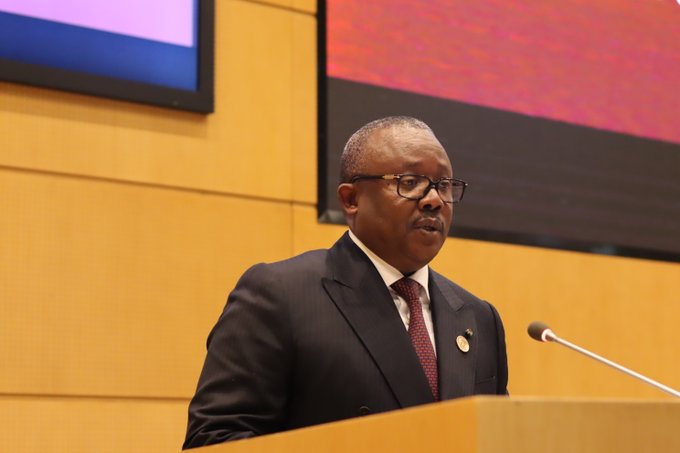|
Getting your Trinity Audio player ready…
|
His Excellency President Umaro Sissoco Embaló of the Republic of Guinea-Bissau, Chair of the African Leaders Malaria Alliance (www.ALMA2030.org), presented the African Union Malaria Progress Report 2022 at the African Union Summit in Addis Ababa. The report highlights the ongoing challenges in the fight against malaria in Africa and the urgent need for strong political commitment and leadership, robust partnership, and increased investments from Member States to reach the goal of eliminating malaria in Africa by 2030.
Since 2000, malaria incidence and mortality have declined by 37% and 59%, respectively. As a result, 1.5 billion malaria cases and 10.6 million malaria deaths have been averted over the past two decades in Africa.
However, according to the report, progress against malaria remains stalled for the last few years. Most Member States are off-track to achieving the African Union’s bold and ambitious targets to defeat malaria by 2030. In 2021, Africa continued to bear the highest malaria burden, with 96% of all malaria cases (238 million cases) and 98% of all malaria deaths (603,877 deaths) occurring in Africa in 2021. Nearly 77% of malaria deaths were among children under 5. This burden undermines our collective social and economic development efforts and is a barrier to achieving the objectives of Agenda 2063 for socio-economic transformation.
“We must redouble our efforts to achieve the goal of eliminating malaria in Africa by 2030. Sustained political will, increased resources, and a shared sense of urgency are needed to make this goal a reality,” said His Excellency Umaro Sissoco Embaló, President of the Republic of Guinea Bissau and Chair of the African Leaders Malaria Alliance. We must work together to ensure that every African has access to life-saving malaria interventions,” he added.
Despite the impact of the COVID-19 pandemic and biological challenges, in 2021, malaria mortality declined by 3.4%. Countries demonstrated solid political commitment, innovation, and resilience, maintaining their essential campaigns so that more nets than ever before were delivered to countries, more children were reached through Seasonal Malaria Chemoprevention, and Indoor Residual Spraying Campaigns continued as planned. However, disrupted access to health facilities and supply chain disruptions have impacted malaria case management and access to essential services such as antenatal care, leading to lower coverage of Intermittent Preventive Treatment in pregnancy.
“The COVID-19 pandemic has highlighted the need for strong and resilient health systems. Investing in ending malaria saves lives and builds stronger health systems that can respond to future pandemics. The African Union Malaria Progress Report 2022 reminds us of the urgent need for increased investment and commitment from Member States to reach the goal of eliminating malaria in Africa by 2030,” said H.E. Amb. Minata Samate Cessouma, Commissioner for Health, Humanitarian Affairs, and Social Development at the African Union Commission.
Despite the global community’s pledge of US$15.7 billion to replenish The Global Fund, the report expresses concern that this fell short of the replenishment’s US$18 billion target. Existing and pledged resources are insufficient to fully support malaria programmes, especially as Member States confront drug and insecticide resistance, low malaria intervention coverage, global inflation, supply chain disruptions, and other economic shocks. Increased domestic resources with strong partnerships are urgently required to maintain lifesaving malaria programmes and avert a resurgence in cases.
The report also acknowledges the efforts of Member States to launch “Zero Malaria Starts with Me” (https://ZeroMalaria.Africa/) campaigns and End Malaria Councils and Funds. In 2022, the Republics of Burundi, Cabo Verde, Cameroon, and South Sudan launched their Zero Malaria Starts with Me campaigns bringing the total number to 27. In 2022, the Republics of Guinea, Nigeria, and Rwanda announced or launched high-level End Malaria Councils. These country-led initiatives help sustain malaria high on the high political and development agenda, mainstream malaria as a priority across all sectors and levels and mobilize millions of dollars of resources for malaria programmes.
“There are a growing number of threats to our goal of eliminating malaria, including the malaria parasite becoming increasingly resistant to antimalarials and mutating to evade detection by rapid diagnostic tests, as well as emerging resistance to insecticides among malaria-carrying mosquitoes. Ensuring that the current malaria interventions are effectively used and tailored to the local context, that new tools needed to address these threats are developed and rolled out as quickly as possible with increased malaria funding and coordinated partnership is crucial at this critical juncture to end malaria for good,” said Dr. Corine Karema, RBM Partnership to End Malaria Interim CEO.
Heads of State and Government are committed to ensuring that all malaria-affected countries will launch End Malaria Councils and End Malaria Funds to increase multisectoral action and domestic resource commitments for malaria. With 27 African countries launching Zero Malaria Starts with Me, the African Union looks forward to having the remaining Member States out of 47 African countries impacted by malaria. Through the launch and implementation of Zero Malaria Starts with Me and by rolling out new innovations to address resistance, countries continue to build on the shared responsibility, global solidarity, strong commitment, and coordinated action demonstrated during the Covid emergency.
The African Union Malaria Progress Report 2022 is now available for download on: www.AU.int and https://ScoreCardHub.org/.
SOURCE: African Leaders Malaria Alliance (ALMA)
